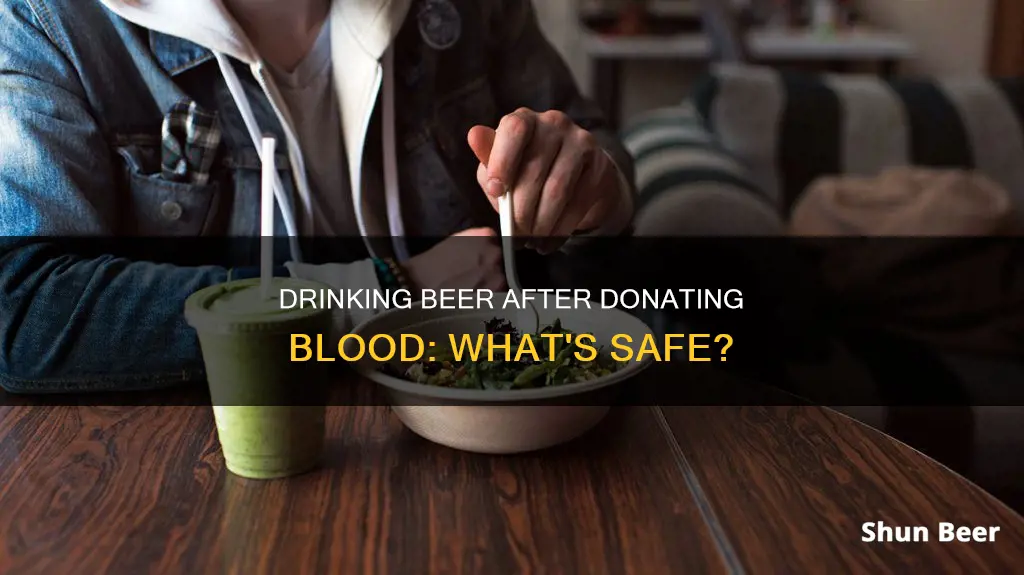
Blood donation is a benevolent act that can save countless lives. However, it is essential to take care of your health after donating blood. One common question that arises is whether it is safe to consume alcohol after giving blood. While it may be tempting to unwind with an alcoholic beverage, it is generally recommended to abstain from alcohol for at least 24 hours after donating. This is because alcohol can cause dehydration, which is already a risk after donating blood, and can lead to lightheadedness, fainting, and dizziness. Additionally, alcohol may affect blood coagulation and negatively impact your ability to make safe choices. To promote a speedy recovery, it is best to focus on rehydrating and replenishing lost fluids by drinking plenty of water, fruit juice, or sports drinks.
| Characteristics | Values |
|---|---|
| Drinking beer after giving blood | It is not recommended to drink beer or any other alcoholic beverage within 24 hours after giving blood |
| Reasoning | Alcohol can cause dehydration, which increases the likelihood of fainting after donation. Donating blood also increases the risk of dehydration, which doesn't mix well with alcohol. |
| How long does alcohol stay in your body | Studies show that alcohol remains in your body for hours or days. The type and amount of alcohol you consume determine how long it will remain in your body. |
What You'll Learn

Drinking beer after giving blood can lead to dehydration
After giving blood, it's important to listen to your body and take it easy. This includes being mindful of what you consume. Drinking beer after giving blood can lead to dehydration, which is best avoided. Here's why:
Firstly, alcohol is a diuretic, which means it increases the rate at which your body eliminates fluids through the renal system, including the kidneys, ureters, and bladder. This diuretic effect is intensified because alcohol reduces the production of vasopressin, an antidiuretic hormone responsible for retaining water in the body. As a result, you lose water more rapidly, increasing the risk of dehydration if you don't actively replenish fluids.
Secondly, when you donate blood, you lose a significant amount of fluid, and it's crucial to replace that lost volume. Drinking beer, which has a diuretic effect, can work against this goal and further deplete your fluid levels. This can lead to dehydration, leaving you feeling dizzy, nauseous, and fatigued.
Additionally, after donating blood, your blood volume and the concentration of alcohol in your system are altered. With less blood to dilute the alcohol, you may feel the effects of beer more quickly and intensely. This heightened impact can lead to dehydration as your body struggles to process the alcohol and maintain fluid balance.
It's important to note that staying hydrated is crucial for overall health and recovery after donating blood. Drinking beer can hinder this process, as it doesn't adequately replace lost fluids and can further dehydrate you. Water is the best choice for rehydration, and it's recommended to drink extra water before and after donating blood.
In summary, drinking beer after giving blood can lead to dehydration due to its diuretic properties and the altered fluid dynamics in your body. To stay safe and support your body's recovery, it's best to avoid alcoholic beverages and focus on rehydrating with water.
Drinking Five Beers: Is It Safe?
You may want to see also

Alcohol may negatively affect blood coagulation
When alcohol is introduced into the body, the blood's ability to clot is compromised. This is because alcohol leads to a lower number of blood platelets, changing their physical makeup and making them less sticky and therefore less able to stick together and form a clot.
In addition to reducing the number of platelets in the blood, alcohol also interferes with blood cell production in the bone marrow. This means that the body is less able to replace the platelets that are lost or used during clotting, further compromising the blood's ability to clot effectively.
The effects of alcohol on blood coagulation can last for several hours after consumption, with some studies showing increased blood pressure and heart rate for up to 13 hours after drinking, and effects on heart rate lasting up to 24 hours. Therefore, it is generally recommended to avoid drinking alcohol for at least 24 hours after giving blood to ensure that the body's blood clotting function is not impaired.
Beer and Meloxicam: Safe or Not?
You may want to see also

Avoid alcohol for at least 24 hours after giving blood
It is recommended that you avoid alcohol for at least 24 hours after giving blood. This is because donating blood increases the risk of dehydration, which does not mix well with alcohol. Alcohol can also cause dehydration, which can lead to an improper flow of blood in your veins. For precise blood flow, your body needs to stay hydrated. If it is not, the process of blood donation can be agitated and take longer.
It is also easier to feel the effects of alcohol after donating blood because there is less blood to dilute the alcohol in your system. Blood volume recovers fairly quickly for people who stay hydrated, so most donors will be able to handle alcohol 24 hours after their donation.
In addition, it can be difficult to find a vein if you have consumed alcohol within the past 48 hours, as it relaxes the muscles. This can make the process of donating blood take longer.
To ensure a smooth and quick donation process, and to avoid putting yourself at risk of dehydration, it is best to avoid alcohol for at least 24 hours after giving blood.
Mouthwash Beer Spray: Effective Mosquito Repellent?
You may want to see also

Alcohol may negatively interact with medication
It is recommended that you wait at least 24 hours after giving blood before consuming alcohol. Drinking alcohol after giving blood can increase the likelihood of fainting.
These interactions can have serious consequences, including gastrointestinal bleeding, liver damage, falls, traffic accidents, and overdose deaths. Older adults are at particularly high risk of harm due to age-related changes in their physiology and their increased use of medications that could interact with alcohol.
It is important to consult with a healthcare professional or pharmacist if you are taking any medication and are unsure about potential interactions with alcohol. They can provide guidance on the specific medications you are taking and advise on any precautions or restrictions regarding alcohol consumption.
- Opioids: When combined with alcohol, opioids can increase the risk of overdose and respiratory suppression, leading to death.
- Antidepressants: Alcohol may increase the side effects of antidepressants on the central nervous system, such as drowsiness and dizziness. It can also reduce the effectiveness of antidepressants and decrease patient adherence.
- Over-the-counter pain relievers: Combining alcohol with certain pain relievers, such as ibuprofen and aspirin, can significantly increase the risk of gastrointestinal bleeding.
- Anticoagulants and cardiovascular medications: Alcohol use is a strong risk factor for major bleeding while taking anticoagulants like warfarin. Additionally, alcohol can interact with cardiovascular medications, causing sudden changes in blood pressure and increasing the risk of heart problems.
Beer Sales Strategies During Doubleheaders
You may want to see also

Even a small amount of alcohol may make you feel more intoxicated
After donating blood, it's important to prioritise recovery and ensure that you're replenishing the blood you've given. This means drinking plenty of water and eating iron-rich foods. It's also recommended that you avoid alcohol for at least 24 hours after giving blood.
Alcohol can cause dehydration, which increases the likelihood of fainting after donation. Since donating blood also increases the risk of dehydration, combining the two can be dangerous. Additionally, there is less blood to dilute the alcohol in your system after donating, so it's very easy to feel the effects of alcohol. Even a small amount of alcohol may make you feel more intoxicated than usual.
The impact of alcohol on your body depends on the type and amount consumed, but it can remain in your system for hours or even days. To ensure a smooth recovery and to avoid any negative side effects, it's best to avoid alcohol for at least 24 hours after giving blood. This gives your body time to rehydrate and replenish its blood supply.
If you're craving a drink after donating blood, opt for water or juice instead. Your body will thank you, and you'll be doing your part to ensure a safe and successful recovery. Remember, donating blood is a generous act that can save lives, so taking care of yourself afterwards is crucial.
In summary, while a beer may be tempting after donating blood, it's best to avoid alcohol for at least 24 hours. The combination of alcohol and blood donation can lead to dehydration and an increased intensity of alcohol's effects. Prioritise your health and well-being by choosing non-alcoholic beverages and giving your body time to recover.
BeerSmith Compatibility: Apple Devices and Beyond
You may want to see also
Frequently asked questions
It is recommended that you wait at least 24 hours after giving blood before consuming alcohol. This is because donating blood increases the risk of dehydration, which doesn't mix well with alcohol.
Alcohol can remain in your body for hours or days. The type and amount of alcohol you consume will determine how long it stays in your system.
It is easier to feel the effects of alcohol after donating blood because there is less blood to dilute the alcohol in your system. Waiting 24 hours allows your blood volume to recover, especially if you stay hydrated.
You may experience dehydration, dizziness, nausea, and pain. Alcohol causes dehydration, which can lead to an improper flow of blood in your veins.
It is not recommended. You should wait at least 24 hours before consuming any alcohol to allow your body to recover fully and to avoid dehydration and other side effects.







